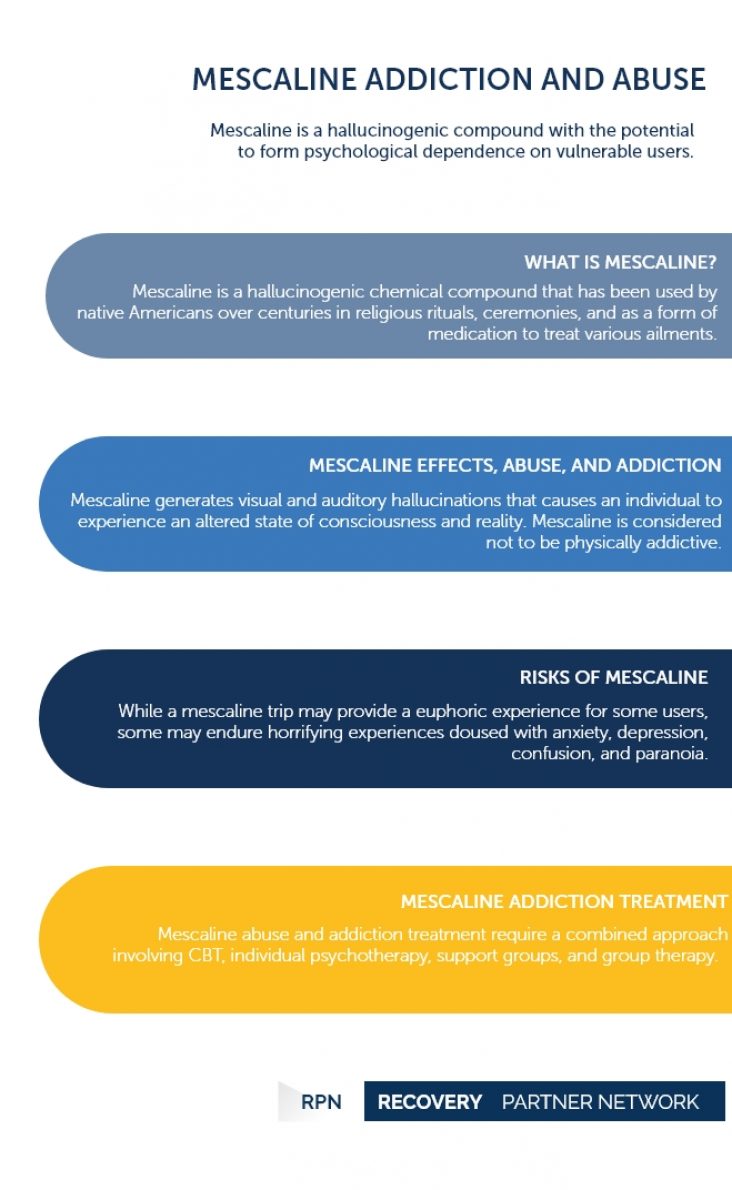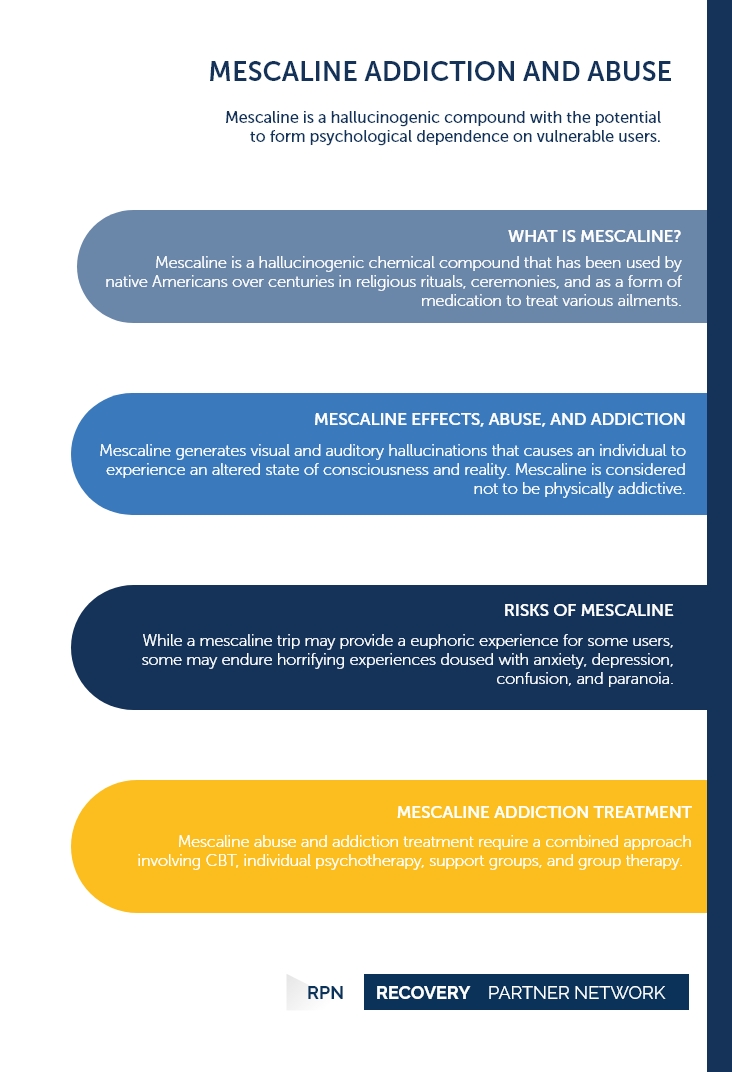Mescaline is a hallucinogenic compound with the potential to form psychological dependence on vulnerable users.
Mescaline Addiction and Abuse
Illicit drugs
- Ayahuasca addiction – Abuse
- Baclofen addiction
- Black tar heroin addiction
- Cannabis addiction
- Cocaine dependence
- Crack cocaine addiction
- DMT addiction abuse treatment
- Does Marijuana Kill Brain Cells?
- Ecstasy addiction
- Gabapentin addiction
- gamma-Hydroxybutyric acid addiction
- Hallucinogen
- Heroin addiction
- Illicit drug addiction
- Inhalant addiction
- Cocaine
- Ketamine addiction
- Lysergic acid diethylamide addiction
- Mescaline addiction
- Methamphetamine addiction
- Meth Labs: Cooking up Addiction
- Meth Mouth
- Microdosing
- Phencyclidine addiction
- Psilocybin mushroom addiction
- Sage of the diviners – Addiction
- Shooting Heroin
- Shooting Methamphetamine
- Smoking Cannabis
- Speedball
- Synthetic cannabinoids
Mescaline addiction | Table of Contents
What is Mescaline?
Mescaline is a hallucinogenic chemical compound that stems naturally from an aboriginal species of cactus known as peyote, native to Mexico, and Texas. However, this compound can also be extracted from Peruvian torch cactus and other mescaline- containing cacti, as well as be created synthetically in laboratories. Mescaline is a rare form of drug as the peyote cactus is relatively sparse.
Mescaline has been used by Native Americans over centuries in religious rituals, ceremonies, and as a form of medication to treat various ailments. Although this drug is classified as a Schedule I Substance in the Controlled Substance Act, it is, however, exempt during the use of religious Native American ceremonies. Mescaline is also known as Peyote, Buttons, Moon, and Cactus.
Mescaline is generally found in the seeds that grow outside of the cactus. These button-shaped seeds are dried and ground into a white powdery substance, which is then transformed into pills or capsules. Some users choose to consume the plant in its dried version by chewing or smoking.
FAQ
It is not advisable to mix stimulants with mescaline. It could lead to increased heart rate, breathing, and blood pressure. Mixing these drugs could also cause panic attacks, paranoia, and unpleasant hallucinations.
Mescaline can be found in its natural dry form, powdered form, and liquid form. They are also available in tablet and capsule form.
Mescaline Effects, Abuse, and Addiction
Mescaline generates visual and auditory hallucinations that cause an individual to experience an altered state of consciousness and reality. This allows individuals to see, feel, and experience things in a different light. The effects of this drug are generally described as dream-like euphoria that could last for 12 hours. The effects of mescaline generally begin one to two hours after its consumption. Mescaline users report experiencing several reactions to the drug, as hallucinogens affect everyone differently. Factors, such as the dose consumed, users’ hallucinogenic drug history, and emotional state play a massive role in how people react to the drug. Although this drug is generally consumed for recreational purposes, some use it to help boost psychedelic therapy or various types of meditation.
The common effects of mescaline are:
- Open and closed eye visualizations
- Euphoria
- Dream-like state
- Laughter
- Slowed passage of time
- Pupil dilation
- Synesthesia
- Hallucinations
Research suggests that although the natives employ peyote for ceremonial purposes, a tiny proportion of them utilize peyote for recreational aims. While the research accessible on this matter is sparse, one study identified that from 89 adolescents, around ten confessed to the illicit use of peyote. Most of these adolescents admitted to using peyote only once or twice in their lifetimes. The adolescents who did indulge in peyote recreationally showed poor social support, self-esteem, and lack of connection with Native American culture.
Signs of mescaline use include:
- Flushed skin
- Headaches
- Changes in mood
- Difficulty sleeping
- Increased energy levels
- Poor co-ordination
- Presence of drug paraphernalia
- Lack of appetite
- Nausea or vomiting
Side effects of mescaline use may include:
- Dizziness
- Weakness
- Diarrhea
- Anxiety, fear
- Racing heartbeat (tachycardia)
- Nausea, vomiting
- Headache
- Accidental injury
- Excessive sweating
- Tremors
- Psychosis, panic, or paranoia
- Post hallucinogen perceptual disorder
- Rarely, suicidal thoughts or actions
- Seizures
- Amnesia (loss of memory)
Similar to other psychedelic hallucinogens, mescaline is considered to not be physically addictive. Nevertheless, it does cause rapid tolerance among its users. During the sage of tolerance, users will require a gradual increase of doses as their body grows accustomed or immune to the previous doses. Users can develop a tolerance to the drug in as little as three to six days. Although rare, some users do find themselves with a psychological dependence on the drug. This is usually caused by an individual’s reliance on the drug to feel better, happy, or normal.
FAQ
- What harm does mescaline do to the body?
- What are the comedown effects of mescaline?
- Can you overdose on mescaline?
The altered state of mind could lead to negative experiences like delusions and terrifying hallucinations that could last up to twelve hours. Some of the other negative effects of the drug include vomiting, numbness, dehydration, nausea, increased blood pressure, a rise in body temperature, and variations in heart rate.
The symptoms of a mescaline comedown include headache, racing heart rate, nausea, vomiting, and diarrhea.
Mescaline is not categorized as addictive, and there are no recorded overdoses due to mescaline.
Risks of Mescaline
While a mescaline trip may provide a euphoric experience for some users, some may endure horrifying experiences doused with anxiety, depression, confusion, and paranoia. Mescaline does encompass the ability to inflict psychological harm on certain users. A bad mescaline trip can end up in terrifying hallucinations that can be traumatizing, especially for individuals dealing with psychiatric disorders, such as prolonged psychosis. Contrary to common belief, there is no proof that mescaline or peyote is effective as a medication. Although this drug is not addictive in nature, long-term mescaline or peyote use may negatively disrupt a person’s life and lead them towards other addictive drugs that possess a higher risk of overdose.
The Complex Legal Status of Mescaline and Peyote
Consuming or possessing mescaline or peyote in America is considered a crime that can carry a prison sentence or fine. However, it remains legal for use in ceremonies and rituals conducted by the Native American Church as they believe peyote to be a vital component of spiritual traditions. Thus, peyote is sanctioned as a religious sacrament that is only to be used and possessed during cleansing rituals. Even though peyote is illegal in Mexico, the government provides access to harvesting and using these cacti by Native American tribes. However, these drugs are strictly prohibited for recreational use by tourists and locals.
Mescaline Withdrawal
The cessation of mescaline may not contribute to physical signs of withdrawal. However, some users may experience psychological symptoms that contribute to taking the drug. Mescaline is often used by individuals as a form of self-medication from psychological issues or mental health disorders. These individuals greatly depend on the drug to help them feel good or normal and, as a result, form a psychological dependence on the drug. Cessation of mescaline would force them to face their underlying issues, which could result in anxiety, depression, and stress.
Mescaline Addiction Treatment
Treatment for psychedelic abuse and addiction generally requires cognitive-behavioral therapy (CBT). This therapy examines and addresses underlying thinking habits that led them towards maladaptive behaviors. Mescaline abuse and addiction treatment require a combined approach involving CBT, individual psychotherapy, support groups, and group therapy.
There are no verified treatments for mescaline use presently approved by the Food and Drug Administration (FDA). However, doctors do prescribe antidepressants, anti-anxiety drugs, and other medications to relieve the effects of underlying psychological disorders during treatment.
Recovery Partner Network
We aim to educate and empower. If you feel our library of resources does not cover your specific need, reach out to us, and we would be happy to help.
STATISTICS
© Copyright 2026


